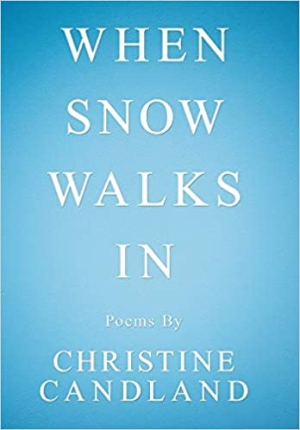When Snow Walks In
The accessible poetry collection When Snow Walks In includes entries that are both literary and personal.
Christine Candland’s powerful poetry collection When Snow Walks In is optimistic, even about unpleasant experiences.
Often celebrating the everyday, these blank verse poems are concise, autobiographical, and rife with lingering emotions. Although they are free from formal poetic constraints, like rhyming, syllable counts, and stanza structures, many of them do draw on poetic devices, as with “My Dad’s Typewriter,” wherein metonymy is used to substitute an Underwood typewriter for the speaker’s father, and which develops its theme—the relationship between the father and his daughter—in a powerful way.
In other poems, end rhymes and enjambment are used, often together, to draw attention to a specific emotion, as in “Mom’s Photo”:
Mother stares at me,
she has seen into the future
and knows I will
leave her.
The connection of “future” and “her,” along with the poem’s dramatic line breaks, results in a melody that builds suspense within the stanza. Each additional line is unexpected, but strong in its emotions: though the regret and dread that comes from the speaker’s decision to leave her mother is not pronounced, it is implied.
Many of the poems are meditative and ekphratic, translating snapshots into words with ease. “When Snow Walks In” is explicit in describing feeling taken aback by a woman who enters a restaurant; it outlines the process of capturing her essence in a drawing. Poems including “Desert Paint,” “Faces,” and “Chasing the Unicorn” also translate works of art into poetic lines.
While most of the entries tell complete stories, a few, including “Before Daybreak,” concentrate on single moments instead, relying on the beauty of language to fill in narrative gaps. This lyric impulse leads to the entries’ moods, characters, and settings being conveyed with ease, as in “Before Daybreak”:
Somewhere between dawn and mischief
after turning on the heat
a roar of endless apologies
sinks down into the carpet.
Even before its focus is named, it is made clear that the subject is a feline arriving home just after a day of exploration. But some of the poems are impeded by cases of redundancy, as in “My Dad’s Typewriter,” wherein a line about the daughter’s thoughts (”Don’t touch it, interrupts my thoughts”) includes an unnecessary explanatory clause.
Many poems in the collection focus on trips to Europe. In these travel poems, local histories are embedded into the language of the poems, evoking the experience of visiting. In “The Sibyls of Siena,” the Homeric language of Mt. Olympus is juxtaposed with a scene of mothers and daughters in the Duomo, capturing a between space in which reverence for history meets with the distractions of tourism.
The collection is topically expansive, moving from contemplating a lifetime spent in domesticity to the excitement of a joy ride. Each poem is strong on its own, if overarching unity is missing.
The accessible poetry collection When Snow Walks In includes entries that are both literary and personal.
Reviewed by
George Hajjar
Disclosure: This article is not an endorsement, but a review. The publisher of this book provided free copies of the book and paid a small fee to have their book reviewed by a professional reviewer. Foreword Reviews and Clarion Reviews make no guarantee that the publisher will receive a positive review. Foreword Magazine, Inc. is disclosing this in accordance with the Federal Trade Commission’s 16 CFR, Part 255.

